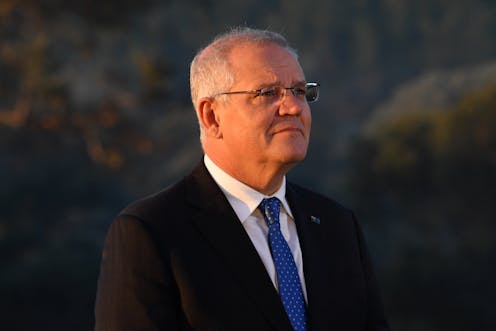Officials resisted Morrison government's attempt to have them 'amplify' election day boat arrival
- Written by Michelle Grattan, Professorial Fellow, University of Canberra

Federal public servants resisted the Morrison government’s attempt to have them amplify an election-day announcement that an asylum seeker boat had been intercepted, according to an inquiry into the incident.
The government hoped publicity about the boat would reinforce its argument a Labor government would trigger the reopening of the people smuggler trade, swaying some voters at the last moment. The Liberal party sent millions of texts about the interception.
The Labor government ordered the Secretary of the Home Affairs Department, Mike Pezzullo, to investigate the events of the day. The report was released by the government late Friday.
A timeline documents how the Morrison government wanted the statement about the boat’s interception sent directly to journalists and posted on social media, but officials declined to do so.
Late morning on May 21, the Minister for Home Affairs’ Office (MHAO) told the bureaucracy the Prime Minister’s Office had asked for a statement to be published about the interception. The statement was to be issued urgently.
Also, “MHAO requested for the statement to be emailed to a list of journalists identified by them. The Department advised that this was not likely a possibility and not something that has been done in the past,” the report said.
“The Department relayed the direction from MHAO to the Secretary [Pezzullo] about emailing journalists. The Secretary directed this is not to occur.”
The department told the minister’s office of Pezzullo’s position.
The minister’s office “directed that the statement be urgently published on the website and requested that the ABF [Australian Border Force] tweet the statement. The Department declined to tweet and advised that arrangements would be made to publish the statement.”
Pezzullo then directed the department that “under no circumstances” was it “to drop the story to selected journalists”. He told it the release “is to be posted to our news and media site – no more and no less”.
Just after 1pm, Morrison commenced a news conference where he was asked by a journalist about the statement – minutes before it appeared on the official website.
In a June 1 letter to Home Affairs Minister Clare O'Neil, accompanying the report, Pezzullo writes it was the responsibility of the minister (who was Karen Andrews) to determine whether it was in the public interest for the interception to be made public.
“The legitimate purposes for previous publications of interceptions have been considered to be for transparency and deterrence,” he writes.
“It was for the Minister to determine the purpose of the announcement.”
“The apolitical character of the public service was preserved in this instance by the refusal on the part of departmental officials to amplify the public statement by sending it directly to journalists and to post it on social media,” Pezzullo says.
“The transparency and deterrence effect was already available from the original public statement.
"Any domestic amplification was judged by officials to be primarily for political purposes. Accordingly, they declined the relevant requests.”
Pezzullo writes that had ministerial instructions been given for amplification, such action could have been contrary to the legal provision for public servants to be apolitical.
“But this potential conflict between the exercise of ministerial authority and that provision in the Act did not arise as the requests to amplify were not pressed”.
In his letter, Pezzullo suggests amending the caretaker conventions that operate during election campaigns. This would specify “that sensitive information that is potentially politically significant should not be released publicly during the caretaker period unless a threat to life exists or some other urgency concerning public safety and security is involved.”
O'Neil said in a statement that the Morrison government had “sabotaged the protocols that protect Operation Sovereign Borders for political gain”
“The report found uniformed Border Force and Defence Force members, and public servants, acted with integrity and at the highest standards at all times. They should be commended for doing so.
"The profound compromise of a military-led operation is without precedent in Australia’s history. It was disgraceful, shameful, and characteristic of a national government which frequently pursued political interests above the national interest,” she said.
Authors: Michelle Grattan, Professorial Fellow, University of Canberra





